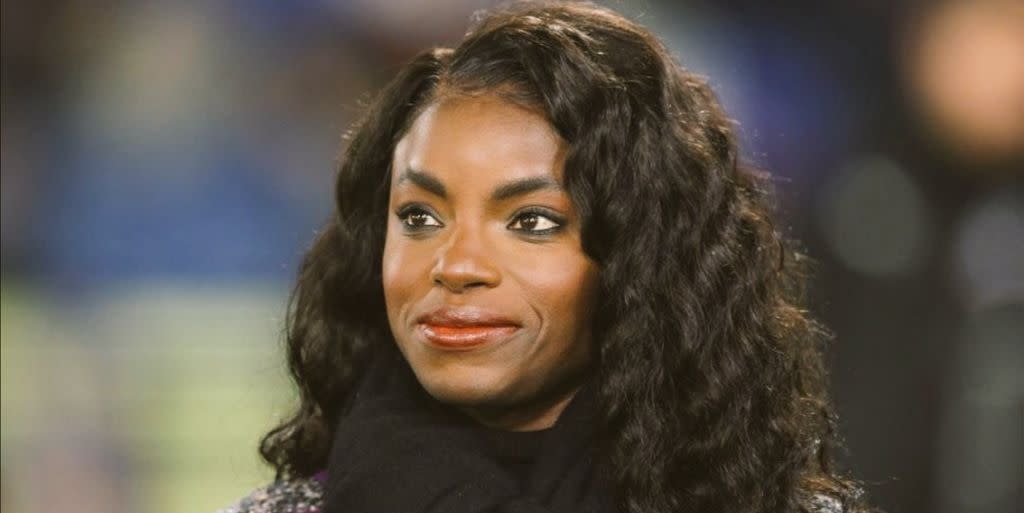Former footballer Eniola Aluko on what we can learn from Olympic athletes

As a former professional football player, Eniola Aluko knows a thing or two about resilience. The athlete, who is now a sports commentator and football executive, is also a one-time Olympian, having represented Great Britain in the London 2012 Games - an event she says she has "only happy memories" of.
"As a footballer, we never really grew up understanding what the Olympics was - in terms of the experience - so 2012 was life-changing," she tells me. We're meeting at a dinner to celebrate the start of the Tokyo 2020 games, hosted by Omega, the official Olympics timekeeper, at the Nobu Hotel in London. "I remember 75,000 people turning up at Wembley. It was crazy, just incredible. And at the time, women’s football was still growing, so it really helped launch women’s football in this country, as well."
Aluko, who also has a first-class law degree, made more than 100 appearances for the England women's football team, before retiring in January 2020. The British-Nigerian athlete is now the sporting director of Angel City FC in Los Angeles, works alongside companies like luxury watch brand Omega - which she describes as a "privilege" - and helps to promote sport as an option for young girls.
"For, it's about the brand story - the history and the legacy - and how it aligns with my own values," she tells me, of who she chooses to work with. "If something makes me feel like a hypocrite if I’m aligning with it, then I won’t. A brand like Omega, and the fact that they’ve been so entrenched in Olympic sport for such a long time, you feel honoured to wear the product and be aligned with it."
Below, the athlete and expert shares the valuable lessons she's learnt about resilience, humility and failure throughout her career.
On overcoming obstacles
"My biggest obstacle has been dealing with failure. I grew up as someone who always set goals and always wanted to do my best and achieve. It was only when I experienced quite a big failure in my career that I realised that I was really afraid of failure and how it made me feel. I thought I’d let everyone down and I’d let myself down, and I thought I wasn’t good enough. But actually, it taught me that failure is a big part of success. You have to sometimes fail to go again. You have to fail to build that resilience. You have to fail to understand what it takes next time. You have to fail to have that humility to know that you’re not always going to be perfect. But it took me a little while and that’s when there were really challenging moments in my career, where I had that fear of failure. And as a striker, you can’t have that. Because you’ve always got to shoot – but you don’t always score. It’s kind of an analogy for life; you’re not always going to succeed. You’ve got to keep trying and keep going. And that’s how I reframe failure. But that journey to get to that point was quite difficult. That was challenging."
On learning from failure
"Now, I’m grateful for it [failure]. Now I think about failing forward, and always knowing that if something didn't work out, that it's redirected me to somewhere else. So, it’s shifted my perspective a lot. I have a much freer perspective on life now. I think, 'OK, I’m going to try it – if it doesn’t work out, fine!'"
On self-validation
"I think people care more about what people say about failure, rather than what it does for them. I’ve learnt also how to validate myself and not seek too much external validation. It takes a while; you don’t just wake up and have that. But I feel so free now – I feel like I have a more carefree perspective on life. I think it comes with experience; you’ve got to put yourself in enough situations to fail, to feel uncomfortable, to then understand that actually, what people think doesn’t really matter. You wake up every day, you go to sleep every day in your own head, and the conversations you have with yourself are the most important. That’s where I feel grateful, content, at peace – because I don’t seek that external noise."
On putting pressure on yourself
"We have to, because we are doing something that only 1 per cent get to do. It’s healthy: that’s how you achieve things that no one else can achieve. So definitely, you put heaps of pressure on. But it’s about having that balance of knowing that if it doesn’t work out, you’re not a failure, the world’s not ended."
On motivation and inspiration
"I get a lot of inspiration from other people’s stories. I get a lot of inspiration from my own background, my parents, my mum in particular. I get a lot of empowerment from knowing that things can change, and I can be part of that change; that I can be part of shaping the next generation’s experience. I get a lot of empowerment from that. I also get a lot of empowerment from history; what the people before me have done in order for me to have a nice life and be free of certain things that they’ve experienced. That really keeps me going."

On what success really means
"Success has been reframed a lot for me. Success obviously is achieving your goals in your career, excelling in your career and doing great things. But success for me is also happiness. Success is spending time with family and feeling super content in that moment. It’s having the ability and the finances to be able to travel and see things that you’ve never seen before. That for me feels like success. That’s really important to me, to have those moments where I just feel happy, content in the simplicity of spending time with friends and family, or travelling somewhere I’ve never been before. Success doesn’t have to mean money. Money helps you do the things that make you happy, but ultimately, if you didn’t have money, you could still be happy. So, just keep hold of those things that make you happy, that’s the most important thing."
On what we can learn from Olympic athletes
"It’s the resilience. It’s the ability to try again. To ask, ‘How am I going to achieve this?’ It’s the ability to identify the steps to make that will help you get to that point. It’s the commitment. It’s the work ethic. It’s the humility. These are all things that are so transferrable to everyone, but a lot of people don’t really put themselves in situations to develop them. Sports and athletics just does. It gives you that resilience, it gives you that perspective. It gives you that heart and that fire burning that never dies. I’ve been retired for two years now and I still feel like I can keep going. I always try and tell the younger generation, build your resilience. Life’s just not [flat]. It’s up and down. But in those moments when it’s down, don’t give up. Keep going. Have people around you that are going to encourage you and keep you going.
You Might Also Like


